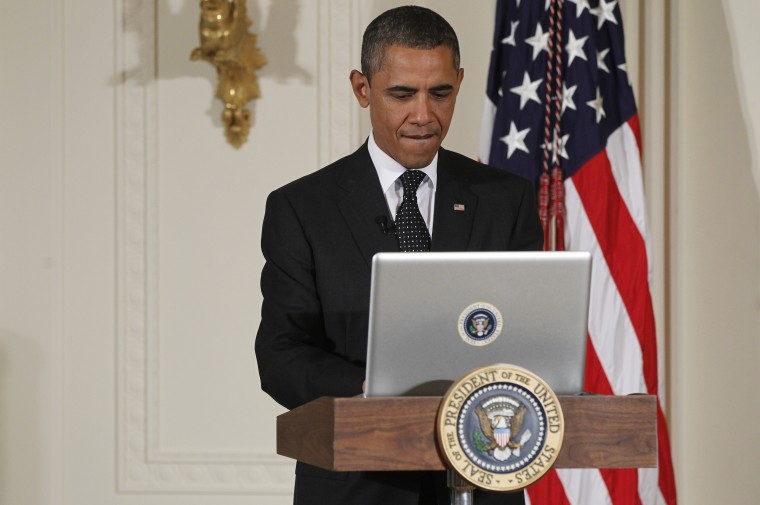When we last checked in on the future of net neutrality, there was quite a bit of
uncertainty. In January, a federal court
struck down the FCC's net-neutrality policy, leaving Obama administration officials looking for a new way to guarantee that all online content will be treated equally.
A few months later, in April, FCC Chairman Tom Wheeler unveiled a
possible alternative, which was quickly condemned by net-neutrality proponents. In May, he tried again with his so-called "
fast lane" policy -- no online content would be deemed less accessible based on service providers' corporate arrangements, but telecoms could charge some companies, such as Netflix, more to deliver their content faster.
For proponents of net neutrality, the fear has been that President Obama, a longtime ally, would break with his previous commitment. He's actually done the opposite -- the White House this morning
made the announcement net-neutrality supporters were eager to hear.
U.S. President Barack Obama asked the Federal Communications Commission on Monday to set the 'strongest possible rules' to protect net neutrality as agency writes new Internet traffic regulations. Obama urged the FCC to prohibit so-called paid prioritization, deals in which content providers would pay Internet companies to ensure smooth delivery of traffic. He said the FCC should reclassify consumer broadband service to be regulated more like a public utility.
I can appreciate why this may seem overly technical, but when it comes to the future of the Internet, Obama's
new position is a very big deal.
The key, as Timothy B. Lee
explained, is the reclassification policy, which is intended to give the FCC "broader powers to regulate broadband networks and protect network neutrality."
Under current law, communications services fall into two categories. The "information services" category is designed for online services such as Facebook and Netflix. The law sharply restricts the FCC's ability to regulate services in this category. The second category, "telecommunications services," is designed for public utilities such as traditional phone service. The FCC has broad powers to regulate services in this second category. For the last decade, the FCC has put broadband internet into the low-regulation "information services" category. Yet in 2010, the FCC tried to impose network neutrality regulations on broadband providers anyway. The courts said that was illegal: if you want to regulate a service like a public utility, you have to first put it into the public utility category. Network neutrality activists have been urging the FCC to do just that: to "reclassify" broadband as a telecommunications service. They believe this is the only way to have strong protection for network neutrality.
And as of this morning, President Obama agrees with them.
Note, while net-neutrality supporters welcome the White House's support, the president's announcement is not determinative -- the FCC is independent and its members will decide on their own.
It's quite likely, however, that Obama nudging the FCC in one direction in a public way will have an effect on the outcome.
FCC Chairman Tom Wheeler said today that the commission is
still weighing its next move, suggesting we probably won't hear about a final decision until the new year.
